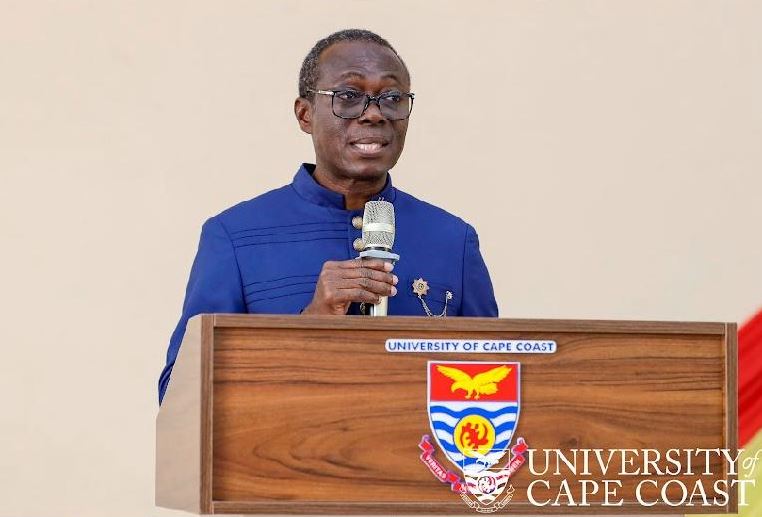The University of Cape Coast has launched its five-year strategic plan for 2023-2027, aiming towards the success of the University.
The new strategic plan is the fourth in two decades and a build-up on the previous strategic plans which adds new elements such as the inclusion of environmental consciousness in the university’s core values.
The inauguration highlighted and celebrated the past strategic plans and their contribution toward the well-being of UCC.


Speaking at the launch of the strategic plan, which was held at the University’s School of Graduate Studies, the Vice-chancellor of the University of Cape Coast, Prof Johnson Nyarko Boampong noted some significant achievements of the 2018 – 2022 strategic plan that cut across academic, research and community engagements.

To him, these accomplishments stand as testaments to UCC’s unwavering commitment to excellence and its ability to translate vision into tangible action.
“As of today, the University of Cape Coast probably holds the top rank position in Ghana and West Africa, while also counted among the top ten universities in Africa,” he continued.
Additionally, the vice chancellor pointed out the University’s notable success stories, including the establishment of the Centre of Excellence for Critical Resilience and the elevation of the Institute for Educational Planning and Administration (IEPA) to the status of a United Nations Educational, Scientific and Cultural Organization (UNESCO) category two institute.
-These achievements, among others, are attributed to the success that stemmed from the previous corporate strategy plan.
Prof. Johnson Nyarko Boampong also underscored the new strategic plan’s alignment with the vision to reposition UCC as a global hub of creative thinkers, offering demand-driven programmes integrated with practical entrepreneurial courses, and actively translating innovative research outcomes for sustainable development.
This vision is structured around five key pillars, each encapsulating specific goals. The first pillar aims to increase student intake, ensuring their success and welfare. The second pillar emphasizes academic distinctiveness, while the third focuses on generating additional revenue and maintaining fiscal discipline. The fourth pillar seeks to enhance visibility and promote internationalization, and the fifth is dedicated to creating an organizational culture that improves efficiency and effectiveness.
The Vice-Chancellor revealed that in line with these objectives, a retreat has been scheduled for January 2024, where all university stakeholders will collaborate to develop operational plans for the year.
This collaborative approach differs from past practices, as the current university corporate strategy plan delineates detailed actions and activities for all, moving away from the division of strategic plans among individual university units.
The Special Guest of Honor and a former Vice Chancellor of UCC, Prof Dominic Domwini Kuupole expressed his satisfaction with the continuity of the development of strategic plans for UCC since 2003.
“In 2012 we launched one, 2018, a build on the previous ones, and this is the fourth. I’m happy this has continued,” he said.
Prof Kuupole emphasized the pivotal role of a well-crafted strategic plan as the foundation for an institution’s success, driving it towards its envisioned future.

He highlighted the necessity of collective commitment, dedication, efforts, and adaptive leadership for the realization of such a strategy.
Additionally, he called for collective engagement in what he described as ‘this transformative journey’, aiming to shape the future of education and have a lasting impact on society.
Source: Comfort Sweety Hayford & Flora Tang/ATLFMNEWS



























